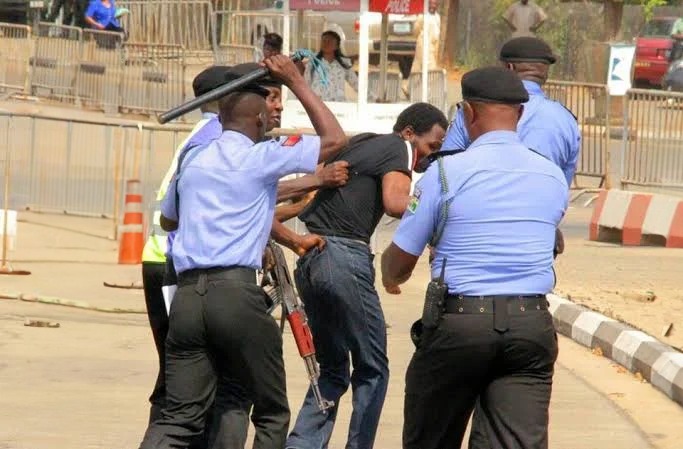
There is something fundamentally wrong with the average person who believes that because they have some power or access to it, they can take the law into their hands and dispense what they consider to be justice. It is upsetting to witness these situations because it makes it seem like people can do whatever they want without consequences. I came across two stories that shed more light on this issue, both involving uniformed men.
Incident One
A civilian lab staff at a navy base in Lagos was allegedly brutally beaten by naval officers for over six hours after a confrontation with a woman who taunted him for caring for a neighbor’s dog. Despite the severe beating, he tragically returned to work, where he died two days later.
Incident Two
A State Security Services (SSS) operative allegedly shot a tailor in the leg in an open market in Abuja after an aggrieved customer sought “justice” for delayed clothing delivery. The other tailors and police officers intervened, accosting and beating up the operative. The SSS promised investigations and disciplinary action if the operative was found culpable.
In both scenarios, we see how uniformed officials, people who were not involved in the initial conflicts, insert themselves into matters that did not concern them. We also see how these people further allowed themselves to be weaponised when their job description did not include stepping into private matters. It is quite shocking because many more instances of abuse of power occur but do not make the news.
Uniformed officers should not step into private matters but time and time again, we find them being invited and taking action on behalf of the citizens who invited them, no questions asked. They do not even compel these citizens to seek justice through proper channels or decline to take action on their behalf. Why does it seem so easy to get a uniformed man or woman to fight one’s battles? How do individuals who have gone through professional training lose their senses and become agents for hire in settling private issues? How does someone who has gone through such strict training even debase themselves to the point of becoming a hired goon? It is a no-brainer that no professional ethos includes this as part of the expectations of their members.
Many Nigerian citizens find it easy to look for a uniformed official to intervene in their private disputes. I cannot count the number of times someone has asked if I had a police or military contact because they needed to resolve an issue. Indeed, many of us have come to see this as an essential connection whenever we are stuck in a jam. Ask them what they expect the uniformed official to do and there is no clear, justifiable reason. We know that men in uniform are more likely to act now and ask questions later which perfectly suits our selfish objectives. We want other citizens who have crossed us to feel the full brunt of our hurt and anger, and who else to call on to dispense this instant justice?
This behavior is a carryover from the military days. When the military governments held sway, the rule of law was not often emphasised and citizens learned to work around things. It is painful to realise that that was twenty-five years ago but it may as well be today with the way some of us carry on. Another reason is that we have become accustomed to leaning into self-help because the wheels of justice grind slowly. Who has time to seek redress through official means when it will most likely not come with instant justice? That is who we have sadly been for a long while. Many citizens do not also trust that the justice system would dispense justice fairly for reasons including the fact that one’s opponent may have access to the keys to justice.
Citizens will continue to abuse power where there are no consequences for the abuse. If uniformed officials who step out of line are not properly dealt with, they will continue to support misguided citizens in achieving their vendettas. The civilians who also weaponise uniformed officials must also face the full extent of the law. No one must be spared. It is unacceptable, and anything short of ensuring that the appropriate sanctions apply will encourage the continuation of this cycle of power drunkenness.
We must always be civil in all of our interactions and proper behavior should be emphasised and expected, both from uniformed officials and civilian citizens. The onus, in my opinion, lies on uniformed officers to decline to fight battles that do not concern them. If they do not, they should be appropriately dealt with when found wanting. Additionally, officers need to undergo constant retraining and reorientation with the enforcement of rules. This is extremely important!
Content provided by EiE Nigeria
‘Gbubemi Atimomo is an HR & business consultant and entrepreneurship advocate in Lagos. He is also the Founder of SideHustleNG and the Convener of The Spirit of Enterprise (TSOE) initiative, both of which are entrepreneurship advocacy platforms.






